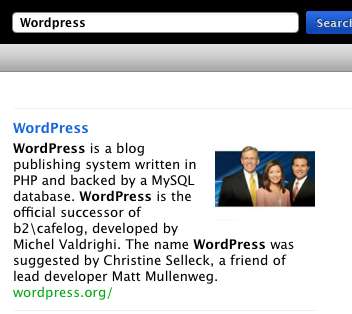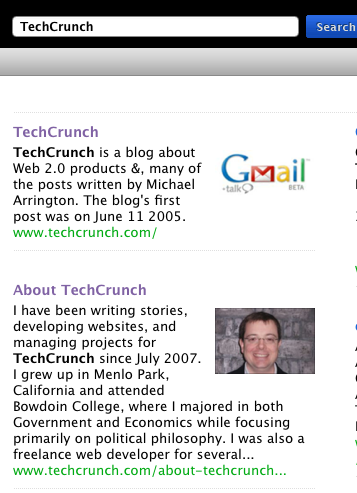 The hype cycle now lasts less than a day. Take yesterday’s over-hyped launch of stealth search startup Cuil, which was quickly followed by a backlash when everyone realized that it was selling a bill of goods. This was entirely the company’s own fault. It pre-briefed every blogger and tech journalist on the planet, but didn’t allow anyone to actually test the search engine before the launch.
The hype cycle now lasts less than a day. Take yesterday’s over-hyped launch of stealth search startup Cuil, which was quickly followed by a backlash when everyone realized that it was selling a bill of goods. This was entirely the company’s own fault. It pre-briefed every blogger and tech journalist on the planet, but didn’t allow anyone to actually test the search engine before the launch.
The company’s founders have a good pedigree, and have developed a unique way to index the Web cheaply and at massive scale. But creating a big index is only half the battle. A good search engine has to bring back the best results from that haystack as well. Here Cuil falls short, as we pointed out an hour after the site launched and we could actually check it out.
The story quickly turned from Google-killer to Google’s lunch (make that an amuse bouche). The results Cuil returns aren’t particularly great, and sometimes completely off the mark. For instance, a search for “Cuil” doesn’t even bring up a link to itself on the first page of results. (See screen shot at end of post).
And when Cuil tries to pair images with sets of search results, it often chooses seemingly random images to accompany a set of results. For instance, “WordPress” is associated with what looks like a TV newscast team and “TechCrunch” is paired with a Gmail logo. And I have no idea who that person is next to the results for our “About” section.


The backlash goes beyond the blogosphere. Friendfeed founder and former Googler Paul Bucheit started this thread of deservedly harsh comments on FriendFeed:
Paul Buchheit posted a message
“Maybe Cuil isn’t supposed to be good. They must know that the results are bad, but they launched anyway. Maybe they aren’t trying to build a full search engine, but just want to demo their crawling+indexing technology with the expectation that someone will buy the company and plug in better ranking.”
. . .
—Where “someone” = MSFT, who has already shown that they are willing to pay a lot for non-functional search engines. – Paul Buchheit
—That is what I was thinking, too. – Robert Scoble
—You’d think they’d work toward getting something relevant if you search on “cuil launch” – Michael Markman
—It’s the only thing that makes sense when you look at how bad the results are. You don’t roll out something like unless you are just showing off the interface. – Kevin Bondelli
—Would also explain the weak branding. Who cares, if it’s just going to get plugged into something else? – Chris Baskind
—Not very good results at the moment I will say – shinchi via twhirl
—It must be so hard to launch something in a realm where there isn’t much tolerance/patience for incremental improvement. The bar in this space is high and consumers are very picky. Look at Yahoo. Their search is actually pretty damn good. However, they keep losing share. – Sacca
—agree with Sacca – also, I thought the people behind Cuil had already sold some search technology to Google and hence they wanted to try it out on their own this time – so if anything they’d have more intent than others not to flip. – Adam Kazwell
. . .
—Google Killer? I do not even need to look to know the answer – Mike Reynolds
. . .
—It’s embarrassing IMO. The results are thin and the images completely wrong. Not good is one thing … Cuil seems a cut below not good right now. – AJ Kohn
. . .
—IMHO there have to be better ways to show off your very own crawling+indexing technologies than opening up to the public and getting thrashed for not delivering what people expect when you dub your service search engine. I have a hard time believing that the cuil/cuill guys did not know what they were doing though … Were they pushed to release by financiers? Were they in dire need of usage data? – Mustafa K. Isik
If you are going to feed the hype cycle, you’d better be able to deliver. Because it only lasts about 20 seconds if you don’t.
(Photo by Steve Jurvetson).
